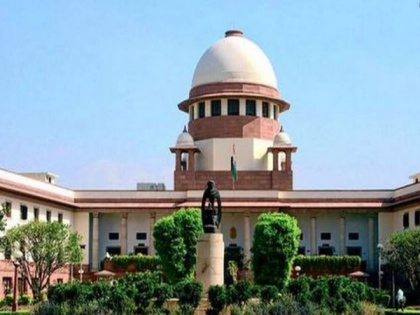Plea filed in SC to establish Transgender Welfare Board to address social welfare issues of trans-people
By ANI | Published: March 1, 2021 11:50 PM2021-03-01T23:50:32+5:302021-03-02T00:00:13+5:30
A petition was filed on Monday in the Supreme Court seeking direction to the Centre and state governments to establish a Transgender Welfare Board to address the social welfare issues of transgender persons.

Plea filed in SC to establish Transgender Welfare Board to address social welfare issues of trans-people
A petition was filed on Monday in the Supreme Court seeking direction to the Centre and state governments to establish a Transgender Welfare Board to address the social welfare issues of transgender persons.
The petition filed by Kinner Maa Ek Samajik Sanstha Trust through its President, Salma Umar Khan Sakerker, also sought direction to appoint a standing committee comprising Station House Officers and human rights and social activists to promptly investigate reports of gross abuses by the police against transgender person.
Transgender people should be treated with the same dignity and respect as anyone else and be able to live, and be respected, according to their gender identity, but these people often face serious discrimination and mistreatment at work, school, and in their families and communities, stated the plea filed through advocates CR JayaSukin and Narender Verma.
The petition said that transgender people are deprived of social and cultural participation and hence they have restricted access to education, health care and public places which further deprives them of the Constitutional guarantee of equality before law and equal protection of laws. The community is facing neglect, isolation, insult, social ostracisation are due to transprejudice that runs deeps in the society and transgenders are still considered "untouchable" in India, the plea said.
It added that the main problems that are being faced by the transgender community are of discrimination, unemployment, lack of educational facilities, homelessness, lack of medical facilities, depression, hormone pill abuse, tobacco and alcohol abuse, penectomy, and problems related to marriage and adoption, the it added.
"The right to recognition as a person before the law is guaranteed in numerous international human rights conventions, and is a fundamental aspect of affirming the dignity and worth of each person. Legal gender recognition is also an essential element of other fundamental rights - including to privacy, to freedom of expression, to be free from arbitrary arrest, and rights related to employment, education, health, security, access to justice, and the ability to move freely," it stressed.
The petitioner further said that in 2014 the Supreme Court delivered its judgment in the National Legal Services Authority vs Union of India case in which it recognised the rights of transgender people in India and laid down a series of measures for securing transgender people's rights by mandating the prohibition of discrimination, recommending the creation of welfare policies.
The Parliament passed the Transgender Persons (Protection of Rights) Act in 2019 and the statutory provisions of the Act prohibit discrimination against transgender people. But the act violates the NALSA judgment on various fronts, the plea stated.
It said the act violates the NALSA judgement by failing to provide reservations in admissions to educational institutions and public appointments by treating the transgender community as socially and educationally backward classes of citizens.
The act gives the District Magistrate (DM) the power to recognise a person as trans, while the NALSA judgment of the Supreme Court allowed self identification of gender, it noted
The petitioner stated that the NALSA judgment had further said that any insistence on SRS (sex reconstruction surgery) was illegal and stressed that self-determination of gender is integral to one's personality and dignity. However, the 2019 Act specifies that to identify as male or as female, one must supply proof of surgery to the magistrate. Activists say this gives immense power to the DM, leading to the possibility of arbitrariness and misuse.
( With inputs from ANI )
Disclaimer: This post has been auto-published from an agency feed without any modifications to the text and has not been reviewed by an editor
Open in app